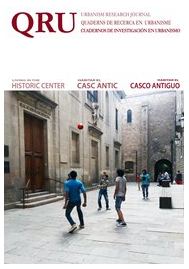Re-imaginar el centro para cambiar la vida: Ciutat Vella como obra del habitar a través del pensamiento de Henri Lefebvre
DOI:
https://doi.org/10.5821/qru.9614Abstract
In the framework of his doctoral research on “human radical space” as a theoretical and critical proposal to overcome the transition to urban post-neoliberalism, the author wonders whether it is appropriate to follow the way of rehabilitation of the old town to recover life, or if there would be another urban principles that allow to reinvent the historical space to change the course of the relations towards a new social life. In this sense, the complete theory of social space and critique of everyday life of Henri Lefebvre is a beacon that illuminates that port. It starts from a critical frame that consists of a statistical review up to the present to introduce the process of urban neoliberalization and crisis of centrality in Barcelona. Thus, Lefebvre’s ideas allow the author: to order the analysis of the urban phenomenon and restore the level of dwelling; to place in the middle, the relation of two essential Lefebvrian projects –the evolution of the critique of everyday life translated into social space-time– and finally, expose an essay that problematizes and reveals the possibilities of a new space in the historical centre. The conjunctions articulate an emancipatory discourse of a concrete urban reality in the old towns of the contemporary city.Downloads
Issue
Section
License
Those authors who have publications with this journal, accept the following terms:
a. Authors will retain their copyright and guarantee the journal the right of first publication of their work, which will be simultaneously subject to the Creative Commons CC BY-NC-ND-4.0 recognition license that allows third parties to share the work provided that its author and its first publication are indicated in this journal, but they cannot be changed or used commercially.
b. Authors may adopt other non-exclusive license agreements for the distribution of the version of the published work (eg: deposit it in an institutional telematic archive or publish it in a monographic volume) provided that the initial publication in this journal is indicated.
c. Authors are allowed and recommended to disseminate their work through the Internet (e.g. in institutional telematic files or on their website) before and during the submission process, which can lead to interesting exchanges and increase citations. of the published work. (See The effect of open access).













